The Foundations
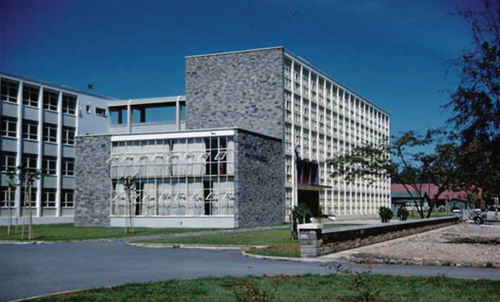
Kenya Polytechnic on Whitehouse Road in 1961 (Courtesy of www.gordonmumford.com (link is external))
The Technical University of Kenya shares history with the development of the first three higher education institutions in East Africa. In the 1920s there were heightened agitations for the expansion of access to higher education by indigenous leaders in the East African Territories. Concerted efforts in the form of committees, commissions and conferences resulted in positive developments that included the elevation of Makerere Institute of to Makerere University College of the University of London in 1949, proposal to establish the Royal Technical College of East Africa (RTCEA) in Nairobi was approved and construction started on 25th January 1952 and establishment of Dar es Salaam University College in 1961.
RTC in Nairobi admitted the first cohort of students pursuing Architecture, Arts, Domestic Science, and Engineering and Science in 1956. Simultaneously, another group of students were registered to the Kenya Technical Institute but admitted (in 1956) within the tuition of RTCEA in Nairobi.
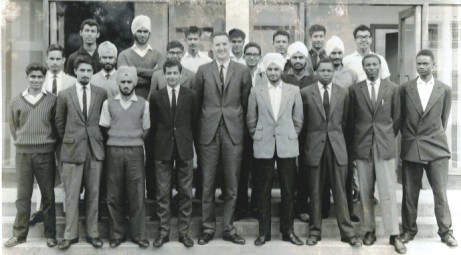 |
|
Kenya Polytechnic Cadet Engineers, class of 1963 (Courtesy of Amu Gather, TU-K Alumni) |
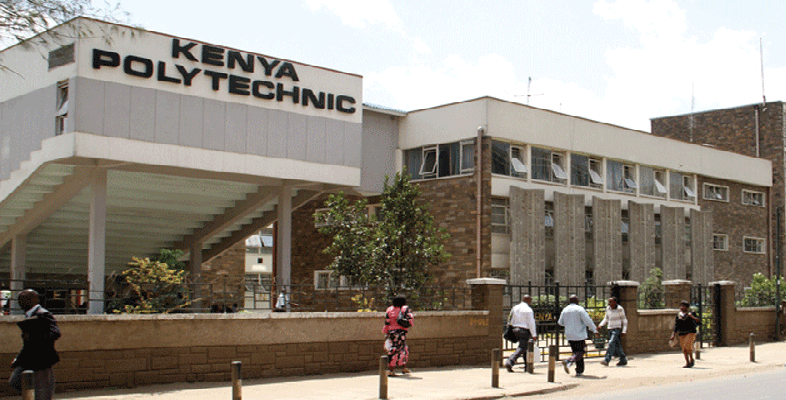 |
|
Kenya Polytechnic Administration Block |
Subsequently, The Kenya Polytechnic was registered by the Ministry of Education as a post-secondary educational institution on 18th January 1967 and assigned registration number 12715. It was initially authorized to carry a maximum of 2, 075 students. Over the years, the Polytechnic experienced great expansion in student enrollment, diversity of academic programmes and in general scope of operations. From its founding, The Kenya Polytechnic quickly established itself as a center of excellence in the training of middle level manpower for Kenya and other East African countries. This function, the Polytechnic has carried with great admiration as testified by the recognition and respect that her graduates have continued to enjoy in the employment market.
The Kenya Polytechnic has been established with the principal objective to train largely in the technical fields, especially, architecture, surveying and planning. The training in these fields would essentially be supported by programmes in the sciences, especially Mathematics, Physics, Chemistry, and Biology. From this, the scope of the subjects offered at the Polytechnic was expanded to include other vocational subjects such as business Studies and Management, Hospitality and Hotel Management, Health Sciences and Technology, and Design and Printing. Also in the 1970's, Computer Science and Information Technology was introduced as a major area of study at the institution. Over the years, it was recognized that even those trained in the technical fields needed to be exposed to social skills that would enable them to interface the technological knowledge with the practical needs of the society. Consequently courses in areas such as communications and general liberal studies were introduced.
The Kenya Polytechnic Univesity College
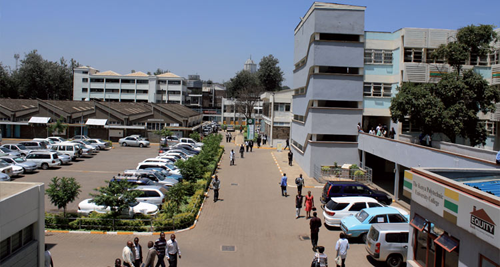 |
|
Kenya Polytechnic University College, University Ground |
In 2005, the Government of Kenya launched the Sessional Paper No. 1 A Policy Framework for Education, Training, and Research. The Sessional Paper provided for upgrading of national polytechnics to offer degree programmes in their areas of expertise. The upgrading was under the special provison that the polytechnics would however continue to offer their traditional tertiary programmes. Thus, the polytechnics were to continue offering education and training at the Diploma level and to continue with the training of middle level manpower. The Sessional Paper, in particular, provided for educational and training path for candidates who have developed through the Technical, and Vocational Education and Training (TVET) programme. Within this framework, the polytechnics would be expected to provide leadership in the TVET and acts as the apex of technical and vocational education and training.
The process of upgrading the Polytechnic was initiated by the Ministry of Education immediately after the launch of the Sessional Paper in 2005. The Ministry formed a committee to oversee this process. After much consideration, it was decided that the best way forward in establishment of the institution as a degree awarding institution was through the establishment of the institution as a university college. It was further decided that as a university college, the institution will be a constituent college of the University of Nairobi. On 23rd August 2007, the President of the Republic of Kenya signed the Kenya Polytechnic University College Legal Order thereby formally establishing the Kenya Polytechnic University College as a constituent college of the University of Nairobi. Although the college was established with effect from August 2007, it did not begin to function as a university college until November 2008 when the Principal for the University College had been appointed.
In July 2009, the university college had the first batch of the programmes of study approved by Senate at the University of Nairobi. The curricula are in the areas of electrical and electronic engineering and comprise the Bachelor of Engineering (B. Eng.) in Electrical and Electronic Engineering, Bachelor of Technology (B.Tech.) in Electrical and Electronic Engineering Technology, and the Diploma in Technology (Dip. Tech.) in Electrical and Electronic Engineering. The programmes are designed to cover to cover respectively five, four, and three years of study for the B.Eng., B.Tech., and Dip. Tech. The first cohort of degree students joined the college in January 2009 and a section of whom has since satisfied the Board of Examiners and has been recommended for conferment of their respective degrees in the convocation of 2011.
The first cohort of degree students joined the college in January 2009 to study for programmes approved by the University of Nairobi Senate in the following areas: The curricula were in the area of electrical and electronic engineering and comprised the Bachelor of Engineering (B.Eng.) in Electrical and Electronic Engineering, Bachelor of Technology (B.Tech.) in Electrical and Electronic Engineering Technology and the Diploma in Technology (Dip. Tech.) in Electrical and Electronic Engineering Technology. The programmes were designed to cover respectively five, four and three years of study for B.Eng., B.Tech., and Dip. Tech.
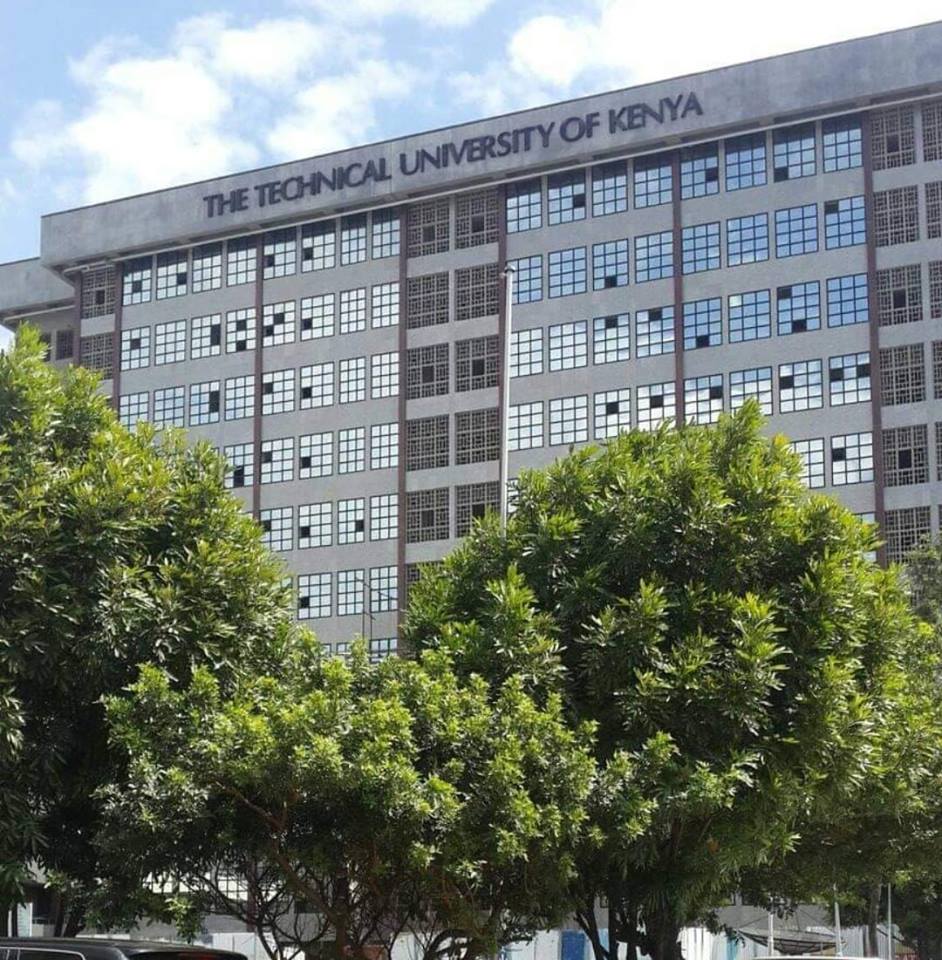 |
|
|
The Technical University of Kenya (TU-K) was established through the elevation of The Kenya Polytechnic University College (KPUC) to full university status. TU-K was established as the first Technical University in Kenya line with the provisions of the proposed Universities Act, 2012. The technical university is a new type of university in Kenya, whose mandate shall be to offer higher education and research in technology. The technical university, as a concept, is being created in Kenya with the objective to be a technological force behind the Vision-2030 drive and the general economic development of the nation. This has come about from the realisation that most countries that have been able to make major technological breakthroughs were heavily propelled through this by their technological universities.
As an institution of higher learning, TU-K shall offers undergraduate degrees at the Bachelor’s level. In this respect it will be noted that in the education of technical personnel at the university level, institutions of higher learning in Kenya have consistently over the years only focussed on the training of professionals at the level of engineers, architects, surveyors, planners, and estate managers. The education and training of the technologist has however been totally neglected in this structure. Given that the technologist is usually the ‘driving engine’ in the actual industrial production, it should be no surprise that Kenya has been unable to make serious breakthrough in industrialisation. To this extent in addition to producing graduates at the fully professional degree level, TU-K continues in the tradition that has been set by KPUC in offering as well degrees aimed at producing technologists.
TU-K continues to produce technologists with the objective to bridge the gap between, say, the engineer and the technician. Traditionally the engineer (or equivalently architect, surveyor, planner, or estate manager) is trained to be concerned with the conceptualisation, innovation, and design of new artefacts and systems. The technologist on the other hand is normally concerned with the actual production of artefacts and the implementation of systems.TU-K offers the degree of Bachelor of Technology (B.Tech.) for those aiming to be technologists. Parallel with this however, TU-K also offers the full professional degrees in various fields. For instance, it is intended to offer degrees such as Bachelor Engineering (B.Eng.), Bachelor of Architecture (B.Arch.), and Bachelor of Commerce (B.Com.).
